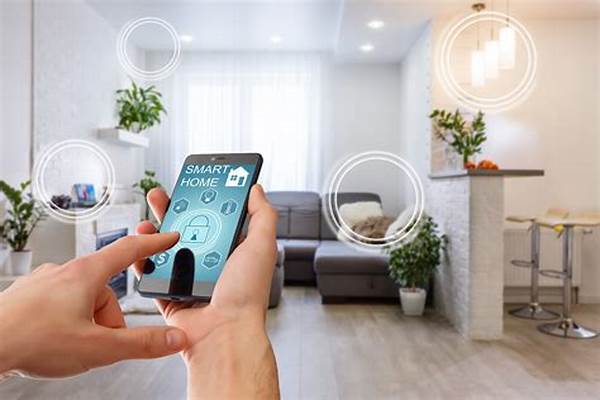In today’s fast-paced world, who wouldn’t want a home that thinks for them, takes care of routine tasks, and even saves money on energy bills? This is exactly what smart home technology integration offers. Imagine controlling your lighting, security, or even your coffee maker with a simple voice command or a tap on your smartphone. It’s time to embrace the future of living with smart home technology integration for unparalleled convenience, security, and energy efficiency.
Read Now : Luxury Geometric Interior Design
The Benefits of Smart Home Technology Integration
Smart home technology integration is not just a trend—it’s a revolution in the way we live. By automating mundane tasks, it provides us the luxury to focus on what truly matters. It allows for efficient energy management, optimizing usage and reducing waste. Moreover, with integrated security systems, you can monitor your home from anywhere in the world, offering peace of mind whether you’re at work or on vacation.
Additionally, this integration promotes a flexible lifestyle. Forget about manual switches or worrying if you left the lights on. Everything from climate control to entertainment systems can be managed seamlessly. As we adapt to modern living, smart home technology integration becomes an indispensable ally, offering customized experiences that cater to individual needs and preferences.
The economic advantages are noteworthy too. Appliances working efficiently mean reduced energy bills, while the long-term durability of smart devices saves money on replacements. For families, it provides a safer environment, with smart locks and cameras enhancing home security. Investing in smart home technology integration is like investing in the elevation of your lifestyle.
How to Start with Smart Home Technology Integration
1. Understand Your Needs: Evaluate your daily schedule and determine where automation could provide the most significant impact. Smart home technology integration should be tailored to fit your lifestyle.
2. Choose Compatible Devices: Opt for devices that communicate well with each other. This ensures seamless integration and maximizes the potential of your smart home network.
3. Start Small and Scale: Begin with a few devices and gradually expand. This phased approach allows you to learn and adapt, making smart home technology integration less daunting.
4. Get Professional Help: For complex systems, hiring a professional installer can ensure a smooth setup. It further guarantees that your smart home technology integration is optimized for performance and security.
5. Stay Updated: Technology evolves rapidly. Keeping your systems updated with the latest software enhances functionality and security, ensuring your smart home technology integration remains cutting-edge.
The Future of Smart Home Technology Integration
The possibilities with smart home technology integration are almost limitless. As artificial intelligence and machine learning evolve, our homes will become more intuitive, predicting our needs before we even realize them. Imagine a home that adjusts its settings based on your mood or current activity, or even a system that communicates with local services for maintenance before problems occur.
Moreover, advanced integration fosters sustainability. Smart homes will be at the forefront of the green movement, with solar integration and efficient energy consumption. They will reduce your ecological footprint while offering unparalleled comfort. The journey towards a sustainable living space begins with smart home technology integration, essential in an era where preserving our planet is more crucial than ever.
Making the Case for Smart Home Technology Integration
1. Convenience: Smart home technology integration simplifies everyday chores, providing newfound freedom for other pursuits.
2. Security: Bolster your home’s safety with cameras, alarms, and smart locks, ensuring you’re always in control.
3. Energy Efficiency: Optimize resource usage, lower utility costs, and contribute to environmental preservation.
4. Cost Savings: Enjoy long-term savings through efficient appliance use and reduced maintenance costs.
5. Lifestyle Enhancement: Customize your living space to fit your preferences, creating a personalized sanctuary.
Read Now : Organic Wall Paint Brands
6. Remote Control: Access your home systems from anywhere, managing settings through your smartphone or computer.
7. Health Management: Monitor indoor air quality and control climate systems for a healthier living environment.
8. Aging in Place: Smart homes support independent living for seniors, enhancing safety and accessibility.
9. Home Value Increase: Boost your property’s market value with modern smart home features.
10. Innovation Adoption: Lead modern living by embracing cutting-edge technology that evolves with you.
Smart Home Technology Integration for Families
The modern family faces countless responsibilities, from managing careers to overseeing school activities and maintaining a household. Smart home technology integration eases this burden by automating many daily tasks. Imagine waking up to a home that has already adjusted the temperature, brewed your coffee, and provided a weather update.
For families, security is paramount. Integrated home security systems offer peace of mind, allowing parents to monitor their homes even when they’re not there. This is vital for ensuring the safety of children and any possessions. Furthermore, energy management systems allow for cost savings, redirecting these funds towards family activities.
Communication is also enhanced with smart home technology integration. Smart assistants can schedule reminders, manage calendars, and even help with homework. The right setup can significantly streamline family life, making interactions and daily routines smoother, more manageable, and more enjoyable.
Smart Home Technology Integration and Your Business
The principles behind smart home technology integration are not confined to residential spaces—they’re equally transformative in the business world. Businesses adopting smart technology benefit from more efficient energy use, reduced operational costs, and enhanced security measures, contributing to improved productivity and profitability.
Imagine an office that self-regulates its energy consumption, adjusting lighting and heating according to occupancy. Such smart solutions lower overhead costs and demonstrate environmental responsibility, enhancing the business’s reputation and appeal to eco-conscious clients. Furthermore, with enhanced security systems, businesses can protect sensitive information and assets more effectively.
In the dynamic business landscape, staying ahead means embracing innovation. Smart home technology integration helps businesses streamline operations and improve employee satisfaction through a more pleasant work environment. This technology is not just an improvement but an essential investment for forward-thinking businesses seeking sustainable growth.
Conclusion: Embrace the Future with Smart Home Technology Integration
As we continue to embrace technological advancements, smart home technology integration emerges as a pivotal player in revolutionizing both our personal and professional environments. Its benefits are vast, from simplifying everyday tasks and enhancing security to promoting energy efficiency and sustainable living. Now is the time to transform your living and working spaces with smart home technology integration.
Unleash the full potential of your home or business by embarking on this technological journey. The future is smart—make sure your space is too. Whether you are seeking convenience, security, savings, or a fuller lifestyle, smart home technology integration is a wise investment that guarantees a transformative impact on your quality of life.





